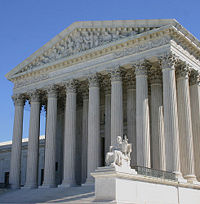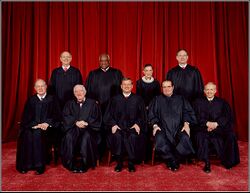Supreme Court of the United States: Difference between revisions
imported>Shamira Gelbman (→History: judiciary act 1789) |
imported>Michel van der Hoek |
||
| Line 5: | Line 5: | ||
==History== | ==History== | ||
===Establishment=== | |||
The Supreme Court is the only court that is provided for specifically in the Constitution, which, in Article III section 1, vests the United States government's judicial power in "one Supreme Court, and in such inferior courts as the Congress may from time to time ordain and establish." | The Supreme Court is the only court that is provided for specifically in the Constitution, which, in Article III section 1, vests the United States government's judicial power in "one Supreme Court, and in such inferior courts as the Congress may from time to time ordain and establish." | ||
In the [[Judiciary Act of 1789]], Congress determined that the Supreme Court would consist of a chief justice and five associate justices. The Supreme Court justices would meet in the national capital for two sessions each year and, when not in session, "ride circuit" to serve on intermediate appellate courts in the rest of the country. | In the [[Judiciary Act of 1789]], Congress determined that the Supreme Court would consist of a chief justice and five associate justices. The Supreme Court justices would meet in the national capital for two sessions each year and, when not in session, "ride circuit" to serve on intermediate appellate courts in the rest of the country. | ||
===From the John Jay Court to the John Marshall Court=== | |||
===The Taney Court=== | |||
===The Chase Court and the Waite Court=== | |||
===Melvin W. Fuller, Edward D. White, and William Howard Taft=== | |||
===The 1930s and FDR’s Court-Packing Plan=== | |||
===Earl Warren and Warren Burger=== | |||
===The Rehnquist Court=== | |||
==The Current Court== | ==The Current Court== | ||
Revision as of 18:08, 7 August 2009
The Supreme Court of the United States of America is the highest federal court in the United States. It consists of nine justices, including a Chief Justice and eight associate justices. Justices are nominated by the President and confirmed by the Senate. Article Three of the U.S. Constitution defines the original and appellate jurisdiction of the Supreme Court, which includes appeals of federal and state cases and trials of cases where a State or foreign ambassador is a party, although the Eleventh Amendment somewhat limits the jurisdiction of federal courts. There is no constitutional specification of how many justices make up the Court, and Congress increased the number as the nation grew.
History
Establishment
The Supreme Court is the only court that is provided for specifically in the Constitution, which, in Article III section 1, vests the United States government's judicial power in "one Supreme Court, and in such inferior courts as the Congress may from time to time ordain and establish."
In the Judiciary Act of 1789, Congress determined that the Supreme Court would consist of a chief justice and five associate justices. The Supreme Court justices would meet in the national capital for two sessions each year and, when not in session, "ride circuit" to serve on intermediate appellate courts in the rest of the country.
From the John Jay Court to the John Marshall Court
The Taney Court
The Chase Court and the Waite Court
Melvin W. Fuller, Edward D. White, and William Howard Taft
The 1930s and FDR’s Court-Packing Plan
Earl Warren and Warren Burger
The Rehnquist Court
The Current Court
The current Chief Justice is John G. Roberts, Jr., whom George W. Bush appointed in September 2005. Roberts is a Harvard-trained lawyer and former Associate Counsel to the President.
The current associate Justices include:
- John Paul Stevens, a Ford appointee in 1975, and the longest serving current member of the court, having served on the Burger Court and the Rehnquist Court. Stevens is also the second oldest Supreme Court Justice in the history of the United States.
- Antonin Scalia, a Reagan appointee in 1986, is a controversial jurist, the most prominent supporter of the concept of originalism and textualism, and Roman Catholic.
- Anthony Kennedy, a 1988 Reagan appointee, is a conservative and libertarian member of the Court, often serving as the swing vote on controversial decisions.
- David Souter, a 1990 George H. W. Bush appointee, has tended towards being more liberal since Planned Parenthood v. Casey. Following the election of President Barack Obama, Justice Souter has announced his retirement from the Supreme Court[1]. Sonia Sotomayor will replace him on the court.
- Clarence Thomas, a 1991 George H. W. Bush appointee, is the second African-American to serve on the Supreme Court after Thurgood Marshall, and has a conservative judicial philosophy, adhering to originalism.
- Ruth Bader Ginsburg, a 1993 Clinton appointee, is the second woman to serve on the Supreme Court (the first being the recently retired Sandra Day O'Connor).
- Stephen Breyer, a 1994 Clinton appointee, and the leading liberal Justice on the court. He has indicated he will be retiring at the end of the 2008 session of the court.
- Samuel Alito, a 2006 George W. Bush appointee, a conservative Catholic, nominated after Bush failed to nominate Harriet Miers to the court.

